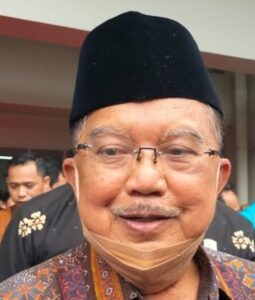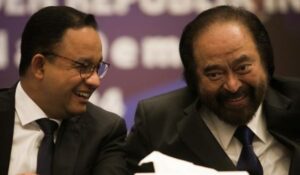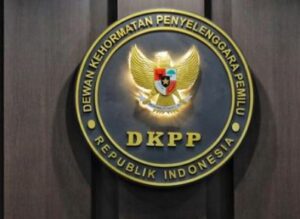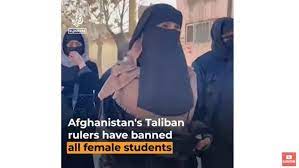
STRATEGIC ASSESSMENT. Former Indonesian president Jusuf Kalla criticized President Jokowi for getting involved in politics too deeply ahead of the elections in a rare rebuke to his former boss. Kalla, who served as Jokowi’s right hand from 2014–19, responded to a meeting between the president and six political party leaders at the presidential palace earlier this week.

The former vice president was critical of the meeting because Jokowi didn’t invite National Democratic Party (Nasdem) Chair Surya Paloh who has become a close ally of the president since the start of his first presidential term. According to Kalla, the exclusion of Nasdem indicated that the meeting discussed political strategies for the 2024 elections.

In his speech at the National Mandate event at Gelora Bung Karno, the presidential candidate from the Nasdem Party, Anies Baswedan, questioned President Jokowi’s attitude in getting involved in supporting the presidential candidate for the upcoming elections, saying a head of state should not do this.
He said the people should not be influenced, moreover with state involvement. He went on to say that the state is impartial, that it takes a stand above all else, and that presidential candidates’ good ideas and track record must come from outside the government, let alone the head of state.
According to the findings of the most recent Saiful Mujani Research and Consulting (SMRC) Institute poll, Ganjar Pranowo outperforms Prabowo Subianto on the critical voter criteria for the 2024 election. Critical voters, according to SMRC Research Director Deni Irvani, are voters who have better access to social information sources. Critical voters are typically lower-middle-class, more educated, and live in urban areas. Additionally, they often have a greater ability to shape the viewpoint of the electorate below them.
Saiful Mujani Research and Consulting (SMRC) Research Director Deni Irvani said on Tuesday that the pollster found a fundamental difference between the prospective PDI-P presidential candidate Ganjar Pranowo and the Change Coalition presidential candidate Anies Baswedan.
Fifty eight percent of respondents considered Ganjar a presidential candidate who could continue Jokowi’s program, followed by Gerindra Chair Prabowo Subianto with 36 percent, and Anies Baswedan with 27 percent. With regard to which presidential candidate is most likely to change Jokowi’s policies, Anies tops the list with 47 percent of respondents, followed by Prabowo with 39 percent and Ganjar with 22 percent.
Nasdem Party Chair Surya Paloh met with Maritime Affairs and Investment Coordinating Minister Luhut Binsar Pandjaitan over a supper at Wisma Nusantara in Jakarta on Friday. They discussed various issues, ranging from the coalition to the vice presidential candidate who would be best suited to run with Anies Baswedan in the 2024 election.
Luhut said that through this meeting, he learned that despite Paloh’s disagreement with the coalition supporting President Jokowi’s administration, he still wanted the achiemevents made by Jokowi to continue.
The relationship between President Jokowi and NasDem Party Chair Surya Paloh has gone to pot since the latter decided to endorse former Jakarta governor Anies Baswedan for the 2024 presidential race.
But it was only recently that the two politicians finally came to terms with the fact they have gone their separate ways in charting the path of the nation’s future, though it is clear that neither of them wishes to burn their bridges, with Maritime and Investment Affairs Coordinating Minister Luhut Pandjaitan now serving as a go-between.
Despite tensions on the surface, political researcher Bawono Kumoro of pollster Indikator Politik believes that both Jokowi and Paloh are still trying to reach a middle ground through Luhut, who has met with Paloh a total of four times over the past six months.
NasDem Party Chair Surya Paloh spoke openly about his party’s position in the government coalition in a recent exclusive interview with CNN Indonesia. Surya Paloh disclosed that his connection to President Jokowi is at its lowest right now.

On May 2, President Jokowi invited six chairs of the political parties that are part of the government coalition to the Merdeka Palace. NasDem was not invited to join the government coalition because the party already has its own coalition. Surya Paloh responded by admitting that he had accepted it.
He also said that his communication relations with President Jokowi, who had previously been rumored to be close, has begun to deteriorate since his party nominated Anies Baswedan as a presidential candidate in the 2024 elections.
Less than a month after leaving pro-government Gerindra Party, former vice-presidential candidate in 2019, Sandiaga Uno, hinted at his interest in joining the opposition Prosperous Justice Party (PKS) as the latter welcomed the possibility of pairing him with its presidential candidate Anies Baswedan in 2024.

Sandiaga has not announced his future plan as he said he was “in no rush” in deciding his next move. When asked about the possibility of Sandiaga joining PKS, also a Muslim-based party but with a different voter base, Chair Ahmad Syaikhu said on Monday he would welcome him into the party.
After meeting with the National Awakening Party (PKB) elite, Golkar Party’s campaign official Nusron Wahid said the two parties were looking to find a running mate for Prabowo Subianto.
Nusron said that Golkar and PKB had just recommended the name of Prabowo’s running mate, and that Golkar will continue to support its chair Airlangga Hartarto.
Nusron said that the grand coalition had proposed Prabowo as a presidential candidate, while the vice presidential candidate would be determined by Prabowo.
Ganjar Pranowo runs Indonesia’s third-largest province, has powerful political friends to emboss his popular appeal and is often billed as the natural successor to President Joko Widodo, if elections due in February 2024 go his way.
But 10 months is a long time in politics as the governor of Central Java can attest, after his support for a ban on an Israeli football team from competing in a Bali competition spectacularly backfired, taking a chunk from his poll ratings. Still, Ganjar has powerful allies – and that bodes well for the election, experts say.

The General Elections Commission (KPU) amended the regulations on the number of women candidates for legislators in each electoral district. This change was approved by the Election Supervisory Body (Bawaslu) and the Election Organizer Ethics Council (DKPP).
Parties that submitted their nominees after the issuance of the regulation were given until May 14 to make changes.








